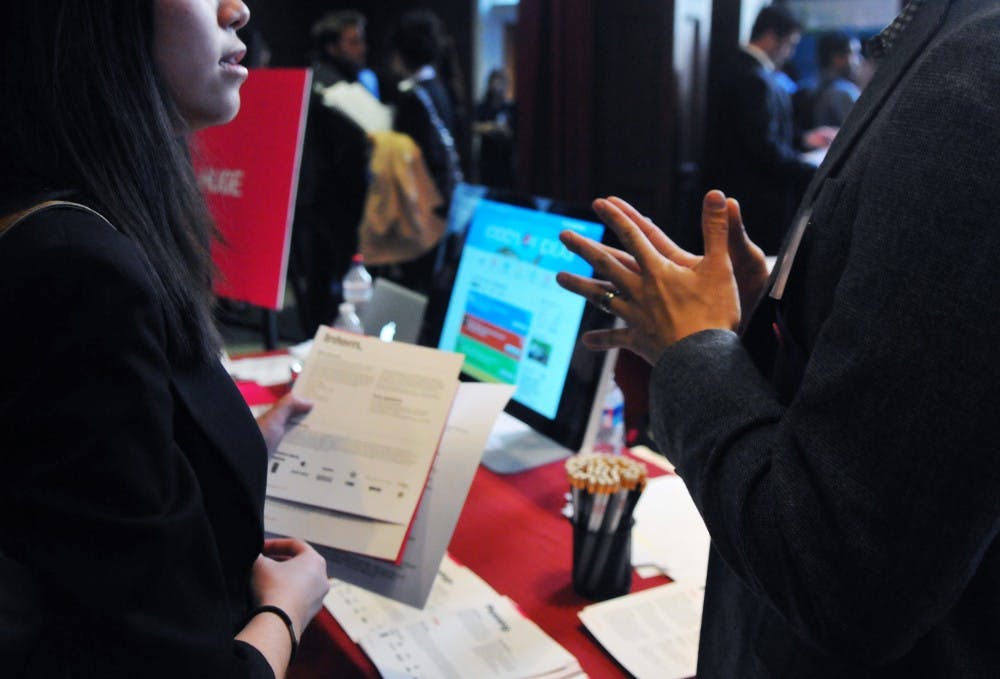
Is a good thing worth sacrificing the opportunity to look for something better?
That is a question that participants in on-campus recruiting have to ask themselves when they are presented with exploding offers and bonuses — employment offers that expire before the formal recruiting process has ended. If the offers “explode” before the end of October, they are in violation of Career Services’ policies governing firms who participate in OCR, but students say exploding offers are still a common issue.
One Wharton senior, who agreed to be identified only by the initial C. in order to protect his employment status, was invited to a super day on the West Coast as a junior but was pressured by the firm to indicate whether he would take their offer before they formally extended it to him. “Basically, the head of the firm asked me over video conferencing if I would take the offer,” C. said. “When I asked for a few more days to think about it, he told me ... to make up my mind first and get back to him.”
A lot of other firms also put pressure on the applicants “in an underhanded way,” C. said. “The school can put whatever policies they want in place, but these guys can obviously think of ways to evade [the policies].”
This year, Career Services published Oct. 28 as the first day firms can demand responses from students to whom they have extended offers. “Most students are not ready, nor should they be, to make a final decision before completing all of their interviews,” the policy reads.
And “regrettably,” the policy continues, pressure to accept early makes it harder for Career Services to punish students who accept one offer but then renege to accept another. Typically, the punishment for a student reneging on a contract is a loss of access to PennLink and to OCR in the future — a double standard that seems to punish students who violate OCR policies because of pressure from firms who are themselves disregarding Career Services’ rules.
C. was also faced with an exploding offer when he recruited for a summer internship.
“I guess I didn’t have to commit, but [the recruiter] kept saying pressuring things like, ‘To me, spoken word is an oath’ and stupid things like that,” C. said. “It made me very scared about going back on my word. Thinking back, I still would have ultimately chosen that firm, but the process was very uncomfortable because it felt like he was making the decisions for me at the time.”
S., another Wharton senior who requested anonymity for fear that his firm would revoke his offer, explained that consulting firms put pressure on desired students more subtly, by having members of the firm reach out.
“For a lot of the consulting firms, they put pressure by calling you. It feels sort of like having 20,000 people reach out to you, which is kind of cool,” S. said. “It’s more friendly, but still a form of pressure.”
In a January post on LinkedIn, Wharton Professor Adam Grant urged companies to realize that exploding offers are counterproductive. “Exploding offers might give [employers] a better shot at hiring star applicants, but they respond with lower commitment — which means less effort and loyalty,” he said in the post.
“it’s very hard because [students] are forced to make these impulsive decisions on these very hard deadlines,” S. said. “And of course being risk-averse like the most of us are ... I think it’s a situation that’s not ideal for people of our age.”
In his post, Grant advised students to conditionally accept the offers with contingencies like being able to find a good solution for paying back student loans. Students, however, seem to believe that conditional responses are not feasible because the recruiters have more to leverage than they do.
Wharton senior Mihir Jain thought Grant’s suggestion was “ideal,” but said that most firms would not entertain conditional acceptances. “There are so many qualified students that if people are put under pressure they’re more likely to just accept it than push back,” he said.
“Coming out of college, at least for me, I find it very hard to see myself negotiating with an MD of a bank,” C. said. “I couldn’t bring myself to push back just because it was very intimidating, negotiating with someone with that much power. ... There’s just such a big power divide. I think in Adam Grant’s example, he’s talking more about if you’re hiring and you’re the only good candidate.”
Instead, C. said his honest advice to other students would be to play along with the firms’ game.
Not all firms that participate in OCR pressure students to make premature decisions, though. Jain has an offer from the Boston Consulting Group, where he worked over the summer, but has not been pressured to commit to working there full time after graduation.
“I’m strongly considering,” Jain said. “I haven’t really received pressure from them. They’ve called me a couple times, but I don’t feel like I’ve been pressured at all. Their deadline is not for a few more weeks.”
Jain acknowledged, however, that many firms do not comply with the policies set out by Career Services.
“I’ve had friends who haven’t been given that much time,” he said. “And that puts them under a lot of pressure.”
The Daily Pennsylvanian is an independent, student-run newspaper. Please consider making a donation to support the coverage that shapes the University. Your generosity ensures a future of strong journalism at Penn.
DonatePlease note All comments are eligible for publication in The Daily Pennsylvanian.








